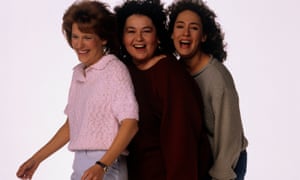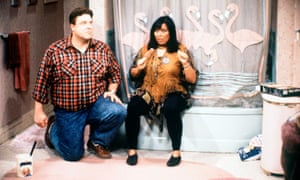Poor, capable and funny: the return of Roseanne, the sitcom that broke all the rules | Television & radio
“We are America’s worst nightmare,†Roseanne Barr said, at the height of her fame. “We’re white trash with money.â€
It was true that the assorted voices of “moral†America, from TV critics to tabloid journalists, did what they could to clip Roseanne’s wings. Her on-set assertiveness (rifts with writers, effing and jeffing) was discussed in a pitch of pearl-clutching outrage that went on for years. Her failed first marriage was taken as proof of an age-old story: the social climber who ditches her loved ones once she gets what she wants. All the mud stuck: at the time, her public image was that of a “difficult personâ€. It didn’t make any dent on her sitcom’s popularity. For its first two seasons (in 1989 and 1990), Roseanne was the most-watched show in the US.
What was extraordinary about Roseanne is that it was allowed on TV at all. Laurie Metcalf, who played Roseanne’s sister Jackie, said afterwards: “Before [Roseanne], it was people walking around in expensive sweaters. I don’t remember people ever looking as realistic as our cast did.â€
When had “white trash†ever been allowed on television? Not as a reality TV car crash; not as the feral grist to a police-show mill; not as the carnivalesque backdrop to a dystopia, but as real people, making their own jokes, describing their own reality?
In the very first episode, the oldest daughter Becky starts rifling through the cupboards for a “food drive†at her school, and Roseanne says, “Tell them to drive some of that food over here.†Sometimes you can only see the taboo when it breaks: decent people are not supposed to be skint; nice families are not supposed to ever think about money, the way heroes of novels never have jobs. Having to haggle with your boss and have your pay docked, to get to a meeting at your kid’s school? This stuff didn’t happen to decent sitcom families before Roseanne, and it hasn’t really happened since.
“Minimum wage back then used to buy a reasonable life if you weren’t an incredibly shiftless, feckless person,†said Linda Tirado, author of Hand to Mouth: Living in Bootstrap America, an author who broke an extraordinary cultural silence in 2013, when she challenged the idea that, in the US, people are poor because they make bad decisions. “The cultural environment has changed because the economic one has.†Since wage stagnation has made the condition of poverty so much harder, it is no longer allowed to be just happenstance, a fact of life; someone has to be at fault, otherwise it would be unjust.
Put simply, you are still allowed to be poor on TV, you can even be poor and sympathetic, so long as you are demonstrably useless. You’re just not allowed to be poor, capable and funny. That was the holy trinity that Roseanne embodied, able to mock her own weaknesses because of her palpable strengths. Yet clearly TV wants that family back: hence its return in the US (a new series is planned for 2018) and why there have been several attempts to create something similar for the UK.
A producer, who wanted to remain anonymous, was working last year on a British version of Roseanne for ITV. “There are so few blue-collar voices on TV, we settled on Roseanne as a perfect template, because it was so out-there,†they told the Guide. “Ours was a woman in Northern Ireland, trying to juggle her kids and working as a cashier. But it’s very difficult to get this stuff away in Britain, because there’s a sense that we have soaps to do that for us. The soaps do the working classes and the other drama does everything else. There’s a note you often get when you’re developing scripts: ‘That’s a bit soapy’. It’s used as a disparaging term.â€
Nobody says what it means, but everybody knows. “Then there’s the idea that people want to watch aspirational telly like The Replacement and Apple Tree Yard,†our insider continued. “Glamorous women who live in nice houses. Then there’s the Kes tradition, the poverty you expect in British film that you won’t accept from British TV.â€

When you create a family that can inhabit and talk about class in a new way, you realise how much else this allows in: Roseanne’s creators were always very clear, that they didn’t have an agenda. “It was never about: ‘Let’s break ground!’ because that’s the kind of thought process that brings up bullshit, contrived stories,†said Amy Sherman-Palladino, a staff writer on the third series, who went on to write Gilmore Girls. “I think that was the real amazing thing about it. Keeping true to those characters and true to life was everything.â€
The obvious risque truth was all the drugs: A Stash from the Past, in series six, has Roseanne calling out some kid because she finds dope in their house, only to remember it’s hers, and then smoke it. That wouldn’t fit in to a flawed-but-caring parent narrative by today’s more prudish terms. Yet I found the less headline-grabbing details on child-rearing more telling.
To go back to that meeting at Darlene’s school, which Roseanne has to be hauled out of work for, a priggish history teacher tells her that her daughter barks like a dog in class, and infers a problem with the warmth of their relationship. “I’d say it’s typical,†Roseanne replies.
“Typical, not special? … Do you spend any free time with Darlene?â€
“I work and have three kids. I have no free time.â€
The orthodoxies that have built up around parenting â€" broadly speaking, that to have any pressures you would put ahead of your children amounts to a subtle but important neglect â€" have completely stripped the comedy out of that scenario; the middle-class do-gooder meeting the tough-minded realist.
Indeed, the domestic terrain seems to have been flooded by right-mindedness, so that there are conflicts TV couples can no longer have. Roseanne and her husband Dan (John Goodman) spend an incredible amount of time yelling at each other about, literally, kitchen sinks, because they’re too “soapyâ€. There are also dilemmas that characters can no longer have, because they don’t adhere to the new absolutism around children (flawed-but-caring is no longer a maternal trope: fathers can still sometimes get away with it). Consequently, “true to life†is quite hard to pull off, now.
Yet the curve is more complicated than a simple surge in social conservatism. Small details from Roseanne’s real life remind us that the decades in which she found her voice were far more openly sexist. Her first husband, Bill Pentland, was interviewed for the near-feature-length E! True Hollywood Story about Barr, and innocently came out with this story. Roseanne’s sister came to stay with them, having taken up radical feminism. “The first thing,†he reminisced, “was a refusal to shave her arms or her legs. I said, ‘As long as you’re staying in my house, I don’t have to listen to this BS.†Her second husband, Tom Arnold, was the more notoriously controlling, but a spouse who thinks he can legislate on your sister’s body hair because he pays half the mortgage …
It was quite a different world, one that arguably needed a lot more of Roseanne’s feminism and instead got the more middle-class creed of equality through self-actualisation.
This preoccupied Barr at the time. “I’ve always felt,†she said in her early career, “that working-class women are the ones who’ve been left out and the ones who the movement really is about.†Tirado notes: “In terms of gender in America, we’re suffering from the same pushback against progress that everybody else is. Have we made any real progress? We led the horse to water. We didn’t actually change any minds.â€
Then there was that “realistic appearanceâ€, the phrase critics use to call people “fatâ€. Danny Jacobson, one of the show’s producers, distilled the insecurities of their early script meetings: “Who’s going to want to watch these people, who’s going to care about a dirty sofa with big people making a lot of dirty jokes?â€

This was in the 1990s; previously, only models had to be model-skinny; suddenly, everybody did. Excess weight was a sign of weak character, or passivity. Why would a person like that be good at anything?
You are still allowed to be fat on TV, indeed, you are positively welcomed, should a romantic lead or a policeman need a slow-witted sidekick. But you wouldn’t get a line like Roseanne’s when Jackie advises her to get Dan in a good mood before she tells him something. (“Jackie, I hardly have the time to get Dan all liquored up, have sex with him and make s’moresâ€). You wouldn’t be allowed to be sexual; you wouldn’t be allowed to be not on a diet; you shouldn’t enabling your husband in his pursuit of empty calories. This new norm â€" that you can only be imperfect if you are in constant combat with your imperfection â€" loops back to the prevailing take on poverty, that it can only be the result of some deficiency in the person living it.
The taste for “aspirational†drama is very often pinned on audiences; tangentially, on economics, on the basis that viewers in recessions want to watch beautiful people in nice houses, to escape their own hardship. There is also, as screenwriter Sally Wainwright has said, always going to be an authenticity gap with programmes about poor people “written by millionaires, with a kind of romantic view that it’s jolly and fun to live on a council estate, rather than consider the truth of having to live like that and have no choiceâ€.
This is a more systemic explanation: that inequality shuts down opportunity, so TV creation is gradually generated only by the middle and upper classes, and a whole load of stories will no longer be told.
Yet I wonder whether the root cause isn’t deeper still; that political imagery and metaphor relies so heavily on poverty as a personal moral failure that a realistic and resonant image of a poor family, in which they are no stupider or lazier than anybody else, presents an affront.
The return of Roseanne might be bigger than nostalgia, then: it might be the start of a fightback.

0 Response to "Poor, capable and funny: the return of Roseanne, the sitcom that broke all the rules | Television & radio"
Posting Komentar